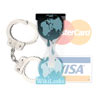 OK. It’s been just over a week since information leaking Web site Wikileaks released the first installment of leaked U.S. diplomatic cables, with each day bringing new documents from the purported hoard of some 250,000 pages, and new developments from a range of very pissed off Western governments.
OK. It’s been just over a week since information leaking Web site Wikileaks released the first installment of leaked U.S. diplomatic cables, with each day bringing new documents from the purported hoard of some 250,000 pages, and new developments from a range of very pissed off Western governments.
The fur is flying so fast and furious around Wikileaks and its controversial head, Julian Assange, that we’re going to relate just the choicest bits for each day.
Looking at the past 24 hours we should note, first, that Mr. Assange has been taken into custody in the U.K., which executed a Swedish warrant for Assange’s arrest stemming from a sexual assault case there. The New York Times is reporting that Assange will resist extradition to that country.
While Assange turned himself in, he found the time to pen an Op-Ed piece for The Australian in which he vigorously defended the release of sensitive cables from the U.S. military and U.S. diplomats about the Afghanistan and Iraq wars and other goings on.
“Democratic societies need a strong media and WikiLeaks is part of that media. The media helps keep government honest. WikiLeaks has revealed some hard truths about the Iraq and Afghan wars, and broken stories about corporate corruption,” Assange wrote, while lamenting the lack of support he has received from the Australian Government.
Needless to say, sentiment among politicians in the U.S. isn’t particularly sympathetic to Assange, Wikileaks or the democratic imperative of transparency – despite the more troubling questions raised about the conditions that led to the leak in the first place. None other that California Senator Dianne Feinstein wrote her own Op-Ed in the Wall Street Journal today that Assange should be tried under U.S. espionage laws for his leak.
Legal doings aside, various forces for and against Wikileaks continued to battle it out online. The main Wikileaks Website, which has bounced around, was reachable, though the Wikileaks.org domain was not resolving to that address – continuing a trend seen in recent days as Wikileaks has sought relief from large scale online denial of service attacks. At the same time, a Website used by the Anonymous hacktivist umbrella group posted a message that claimed that it, too, was experiencing large scale DDoS attacks.
Following the lead of online payment service PayPal, Mastercard and Visa Europe said on Tuesday that they, also, would stop processing payments and donations to the organization. Wikileaks said it was partnering with Datacell, a Swiss payment processor, by direct transfer into bank accounts set up in Iceland and Germany, or through a mailed donation.
Despite a tightening noose around the organization from governments, law enforcement and the private sector, Wikileaks continued to succeed in getting its message out online. Prominent social networks Twitter and Facebook continued to provide a platform for the group, despite scattered reports that Twitter may have been filtering Wikileaks related tweets in compiling its trending topics lists – a charge that a Twitter spokesman strenuously denied. Facebook said that the group has not violated its terms of use and that there are no plans, currently, to remove Wikileaks Facebook page, according to a report on ReadWriteWeb.









